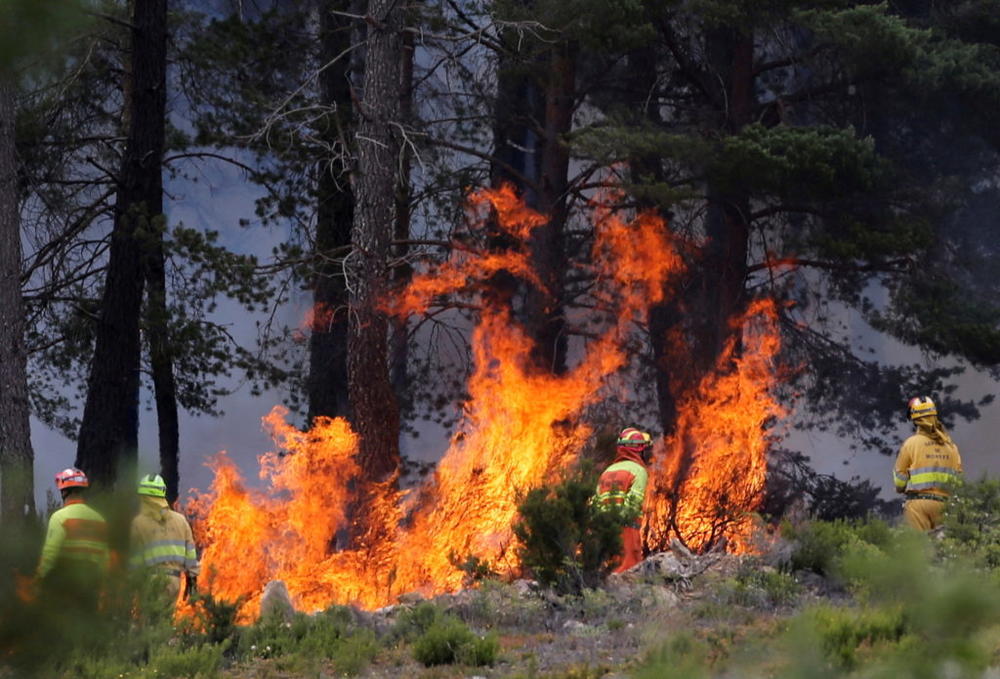
Section Branding
Header Content
Georgia Today: Fulton County Sheriff on Trump indictment; New aviation program; Too Hot To Work
Primary Content
LISTEN: On the Wednesday, Aug. 2 edition of Georgia Today: The Sheriff of Fulton County weighs in on yesterday's federal indictment of Donald Trump; a West Georgia college offers a new aviation program; and part 1 of a new three-part series on how rising temperatures from climate change affect our lives.

GATODAY_08.02.23.mp3
Peter Biello: Welcome to the Georgia Today podcast from GPB News. Today is Wednesday, Aug. 2. I'm Peter Biello. On today's episode, we get a little insight into what will happen if former President Trump is indicted in Fulton County. A West Georgia college aims to help address a pilot shortage. And we'll hear the first of three stories on dangers associated with high temperatures and climate change. These stories and more are coming up on this edition of Georgia Today.

Story 1:
Peter Biello: The sheriff in Atlanta's Fulton County says former President Donald Trump will be treated like anyone else accused of a crime if a county grand jury indicted him for his role in trying to overturn Georgia's 2020 election results. The comments by Sheriff Pat Labat came hours before Trump's indictment by the U.S. Department of Justice yesterday on federal charges related to election interference and the attack on the U.S. Capitol. Labat says normal practices include fingerprints and mug shots.
Sheriff Pat Labat: We'll follow our normal practices, and those who take mug shots will be subject to an open records request like everyone else.
Peter Biello: Fulton County District Attorney Fani Willis is expected to make decisions in coming weeks on state charges. Yesterday's federal indictments include 48 mentions of Georgia activities that might preview what's to come from Willis.
Story 2:
Peter Biello: Federal authorities are on the lookout for a Georgia man who they say pocketed millions of dollars meant for Christian missionary work in China. GPB's Benjamin Payne reports.
Benjamin Payne: Jason Gerald Shenk is accused of defrauding donors to the tune of $3 million. And a newly unsealed indictment, federal prosecutors say Shenk raised that money from Christian charities and individuals, mostly in Ohio and North Carolina, from 2010 to 2019. He told the donors their money would be spent on buying Bibles to distribute in China. Instead, Shenk allegedly spent it on himself buying diamonds Real estate in Chile. Shares in a nuclear energy company and payments to his family farm, among other things. Prosecutors say Shenk renounced his U.S. citizenship in 2016 to skirt financial reporting requirements. Warrants have been issued for Shenk's arrest, but the fugitive's whereabouts are unknown. For GPB News, I'm Benjamin Payne.

Story 3:
Peter Biello: A West Georgia college is launching a new minor in aviation this fall to help address a shortage of pilots. GPB's Devon Zwald reports.
Devon Zwald: The program at LaGrange College provide students with training that will prepare them for careers as private charter pilots, cargo pilots or airline pilots. A job the U.S. Bureau of Labor Statistics projects will have about 18,000 openings each year through 2031. The college's John Head says students can accumulate flight hours while earning academic credits that count towards graduation.
John Head: Making it an easier way to get that license. You're — if you're planning to go to college, you can do this while you're in college. It's not anything you have to do outside of what you would normally be doing as part of your college career.
Devon Zwald: He says the program is designed so that students can get their commercial pilot license during their four years at LaGrange College. For GPB News, I'm Devon Zwald.
Story 4:
Peter Biello: A man accused of shooting and killing one woman and injuring four others at a Midtown Atlanta medical practice has been indicted on charges including murder. A Fulton County grand jury indicted Deion Patterson last week in the May 3 shooting. Patterson is charged with murder and felony murder in the death of a 38-year-old woman. He's also charged with four counts of attempted murder.

Stoty 5:
Peter Biello: Fulton County commissioners have agreed to spend nearly $1.7 billion to build a new jail. The county's 35-year-old jail has been overcrowded for decades and is the subject of lawsuits and a federal investigation. County Public Safety Director Alton Adams told commissioners this morning the Department of Justice probe heightens their decision.
Alton Adams: In addition to the compelling need with the structure and the threat that it provides to our — not only our deputies but the individuals who are in the jail, I do think there's a certain inevitability of this that we need to consider in light of the the investigation.
Peter Biello: Commissioners discussed possible funding sources, including higher sales taxes.
Story 6:
Peter Biello: Four Georgia district attorneys want a judge to strike down a new state law that created a commission with the power to discipline and remove them. Republicans created the Prosecuting Attorney's Qualifications Commission earlier this year. It's meant to target what they call, quote, "far left prosecutors" who are, quote, "making our communities less safe." In a lawsuit filed today, the four days, three Democrats and one Republican say the panel violates state and federal laws about prosecutorial discretion, a bedrock of the American judicial system.
Story 7:
Peter Biello: The director of Georgia's state Parks and historic sites will become the new director of Georgia's Environmental Protection Division later this month. The Department of Natural Resources Board today approved Gov. Brian Kemp's nomination of Jeff Cown to be the state's top environmental regulator. Cown will succeed Rick Dunn, who left EPA to serve Kemp's Office of Planning and Budget. Cown will oversee the agency's handling of several hot-button issues, including a plan for a mine near the Okefenokee Swamp and how the state will regulate coal ash stored in ponds near coal-burning power plants.

Story 8:
Peter Biello: Heat waves across the United States this summer are an indicator of what's to come as climate change drives rising temperatures. The federal government has promised it will create more heat, safety and mitigation measures as the chance of heat-induced illness and death goes up. In part one of our series on heat, GPB's Sofi Gratis reports from South Georgia farms, where agricultural workers who can't escape the heat face some of the highest risks.
Sofi Gratis: On a Tuesday in June in South Georgia, farmworker Silvia Moreno Ayala looks out over the fields of the family owned farm she’s worked for 17 years.
Silvia Moreno: Me encanta ver cómo es que plantamos una planta pequeña y con nuestro cuidado logramos ver un fruto. Eso es lo que me fascina.
TRANSLATION: I love that when we plant seedlings … with our care, we get fruit.
Sofi Gratis: Soon, this field will have watermelons. A breeze comes through.
Silvia Moreno: Rica.
TRANSLATION: Delicious.
Sofi Gratis: Moreno’s crew starts work early to avoid the hottest parts of the day. But by mid-morning, the temperatures reach the high 80s, and with the sun beating down on the field and 70% humidity, it feels hotter.
Silvia Moreno: Es hora del agua papi. Es la hora del agua.
TRANSLATION: It's water time, dad. It's time for water.
Sofi Gratis: It’s time for water, Moreno tells the workers, one of which is her 16-year-old son, Arturo. From a cooler on the back of Moreno’s truck, Arturo picks a up Capri Sun. It’s his third summer helping his mom on the farm.
Arturo: first few days you’re going to get really tired and you’re going to be sore a lot. But like after time you're going to get used to it you just have to get used to the sun most.
Sofi Gratis: This day marks the first of many hot days this summer. Farmer Stanley Copeland, Moreno’s boss, says he’s preparing for heat waves.
Stan Copeland: Just making sure we got shade for the livestock and making sure our evaporative systems for chickens is in good shape
Sofi Gratis: But for Silvia and her crew?
Stan Copeland: Like I say, we got people smart enough. They'll take care of themselves in groups.
Sofi Gratis: Copeland says they can handle the heat. But that’s not always true. Moreno says in larger fields it can take them an hour to make it to the end of a field and back. They can’t bring the cooler with them. Often, Moreno will run out of water. She’s gotten dizzy and nauseous with heat exhaustion.
Silvia Moreno: Se siente que se para el corazón
TRANSLATION: It feels like my heart is stopping.
Sofi Gratis: And years of working on farms has had long term effects, too. For almost a decade, Moreno has had chronic kidney infections.
Silvia Moreno: Precisamente porque no nos hidratamos, o más bien el agua no nos alcanza, porque toda el agua que estamos tomando la estamos sudando.
TRANSLATION: Precisely because we can’t stay hydrated. All the water me and other workers drink throughout the day just gets sweat out.
Sofi Gratis: Farmworkers don’t have as many labor protections as other workers in the U.S. They often don’t get overtime pay. Many work without health insurance. And migrant farmworkers — over half of those in the Southeast — are subject to lax housing provisions that don’t even require air conditioning. As climate change brings more dangerously hot days, farmworkers are put at higher risks. Already, agricultural workers are estimated to die of heat stress at rates 35 times higher than other laborers. Excessive heat can cause fever, confusion and body aches. In fatal cases, when internal body temperature gets too high, the body is unable to cool itself down. But many farm workers don’t know all of this. A couple years ago, Erin Ferranti with the Emory University School of Nursing conducted a study with South Georgia farmworkers, to gauge their understanding of heat-related risks.
Erin Feranti: Do they know what heat illnesses, would they know how to recognize the signs and symptoms, and would they know how to respond? And what we found was that their knowledge level was quite low.
Sofi Gratis: Roxana Chicas, also with Emory University and with her own set of studies on farm worker, says …
Roxanna Chicas: It's not just about educating farmworkers, the laborers, it's also about educating growers. For too long, ever since, you know, even when we were enslaving people, the mentality has been that people of color are built to withstand the heat, right? That they're conditioned to be able to work out in the heat.
Sofi Gratis: Which is not true. The Occupational Safety and Health Administration, or OSHA, the federal government’s lead worker safety agency, says access to water, rest, and shade for those working in the heat can be lifesaving. Even then, convincing farmers with already tight margins to adopt more heat protections on their own dime may be difficult, says Director of the University of Georgia Weather Network Pam Knox.
Pam Knox: If you have to give your workers more frequent work breaks, it's an economic cost because it's going to take you longer to get a crop harvested right.
Sofi Gratis: But Juley Fulcher with Public Citizen says farmers — and other employers too — are likely already paying the price when workers are slowed down by the heat.
July Fulcher: They are not doing their work as well. They are more likely to get injured. So employers are already spending money on this. It would be cheaper to solve the problem.
Sofi Gratis: On a watermelon farm near Pitts, Ga., a week before July 4th, temperatures reach a high of 97 degrees. It’s the same heat that killed a farmworker picking tomatoes 70 miles south, almost five years to the day. Workers toss melons down a line from one pair of hands to the next. When one bus is filled, another one drives in. They take water breaks in between. During lunch time, the workers mull around a five-gallon cooler and find relief under a shade tree. Jesus Lopez Damian chugs from a 2-liter coke bottle. It’s his third season in the U.S. as a farm worker.
Jesus Lopez Damian: hay muchas personas que piensan eso, que el dinero se gana fácil. En realidad. Se tiene que matar acá en el sol y calor.
TRANSLATION: There’s a lot of people that think we make this money easily, he says. The reality is, you need to kill yourself under the sun and in the heat.
Sofi Gratis: Sitting beside him, Victor Manuel Montes Jasso agrees. During his first season working in the U.S., Montes says he’s learned that even with breaks, there is always a risk of getting sick.
Victor Manuel Montes Jasso: No hay ninguna manera de protegernos para el sol está pesado el trabajo aqui. Pero Hay que trabajar. Verdad? A eso vinimos, A echarle ganas.
TRANSLATION: There’s no way to protect ourselves from the sun. This job’s a pain, but we need to work, right? That’s why we came here, to work hard.
Sofi Gratis: He hopes to come back next year. Many farm workers that are undocumented or here on temporary work visas often face retaliation if they report poor working conditions, says Alma Young with the United Farm Workers Foundation in South Georgia.
Alma Young: You know, when I reach out to workers and talk about the benefits of reporting, their concern is that they have tried that in the past and nobody listens to them. And they see that not as a benefit but something that will harm them.
Sofi Gratis: Because on top of the discrimination farmworkers face already, there’s no federal law that ensures heat protections for workers. But that could change. Two years ago, OSHA issued an advance notice of rulemaking for heat injury and illness prevention — essentially a heads up that the agency is working on a federal heat standard that would outline workers rights and employers responsibilities. South Georgia Farm Worker Silvia Moreno Ayala says this would be huge for worker safety.
SIlvia Moreno: Si ellos metieran a ellos en el FIL, los patrones temerían … decían con ellos no se juega.
TRANSLATION: If they put OSHA agents in the fields, the bosses would be scared. You don’t play with OSHA.
Sofi Gratis: But, because of a notoriously slow rulemaking process, a federal heat standard from OSHA isn’t expected any time soon. It could be a far as 10 years away. Meanwhile, it’s only getting hotter. For GPB News, I'm Sofi Gratas in Macon.
Peter Biello: And tune in tomorrow during Morning Edition and All Things Considered for Part 2 of "Too Hot to Work," a reporting project of GPB News and Time.
Story 9:
Peter Biello: In sports, in baseball, the Atlanta Braves beat the Los Angeles Angels today, 12 to 5 to win the series two games to one. Austin Riley and Matt Olson hit back to back homers and Ronald Acuña Jr. launched a three-run homer to help power the Braves. The Braves let the Major League Baseball trading deadline passed yesterday without last-minute activity. In the last few weeks, the Braves needed a backup infielder in two relief pitchers, including left-hander Brad Hand from the Colorado Rockies. Hours before the deadline, Braves general manager Alex Anthopoulos says they did look into adding another starting pitcher, but ultimately he didn't want to trade away prospects that could be great players in the coming years.
Alex Anthopolous: You can't force deals, right? So, look, there's plenty of deals. We could have been here and say we acquired three players, four players for a bunch of prospects that we really like, and maybe there's a halo effect for that. But three years from now we might look back and say those would have been terrible deals for us.
Peter Biello: Anthopoulos says he's confident that Kyle Wright, Dylan Lee and Jessie Chavez will pitch well when they come off the injured list. The Braves have the day off tomorrow before hitting the road for the next 10 games in Chicago, Pittsburgh and New York.
And that's it for this edition of Georgia Today. Thanks so much for tuning in. We hope you come back tomorrow. We've got more news coming your way, including Part 2 of the series on Heat from GPB's Sofi Gratis and Time. If you want to learn more about any of the stories you heard today, visit GPB.org/news. And if you've got feedback, we'd love to hear from you. Send us an email. The address is GeorgiaToday@GPB.org. I'm Peter Biello. Thanks again for listening. We'll see you tomorrow.
---
For more on these stories and more, go to GPB.org/news.



